Statistics, social spending and spills: The week at the mañaneras
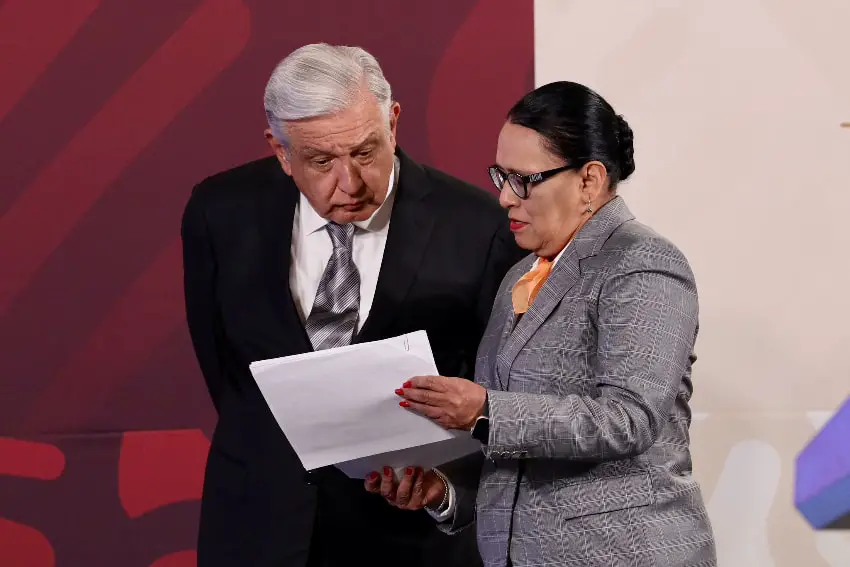
A Gulf of Mexico oil spill, the Texas government’s installation of a floating barrier in the Rio Grande, the income gap between Mexico’s richest and poorest citizens and the global manpower of two powerful Mexican criminal organizations were among the issues President López Obrador discussed at his morning press conferences, or mañaneras, this week.
Other officials offered reports on bilateral and trilateral meetings with United States and Canadian officials held Monday and Tuesday, at which migration and fentanyl were at or near the top of the agenda.
Monday
During the weekly update on the Maya Train railroad project, the general director of the National Institute of Anthropology and History (INAH), Diego Prieto, announced that a new section of the Chichén Itzá archaeological site in eastern Yucatán state would open on Sept. 2.
“We’re going to open a new area so that visitors can have a much more enriching experience,” Prieto said, adding that the new section is called Chichén Viejo, or Old Chichén.
The INAH chief also noted that a “great archaeological museum” is under construction at the site of Chichén Itzá, near which a Maya Train station and Maya Train hotel are being built.
Early in his engagement with reporters, López Obrador fielded a question on Fitch Ratings’ recent downgrading of Pemex’s long-term foreign and local currency issuer default ratings to B+ from BB-, which puts the state oil company deeper into junk territory.
“It doesn’t affect anything,” AMLO said of the downgrade. “… Pemex’s debt has been reduced and we can prove that,” he said before citing data that showed that its liabilities have declined 15.5% since he took office.
The president, repeating a claim he has made previously, accused rating agencies of bias against his government, considering that they gave “very good” ratings to Pemex and the Federal Electricity Commission when “corruption reigned” within those state-owned firms.
“All this from the rating agencies is a joke,” he said dismissively.
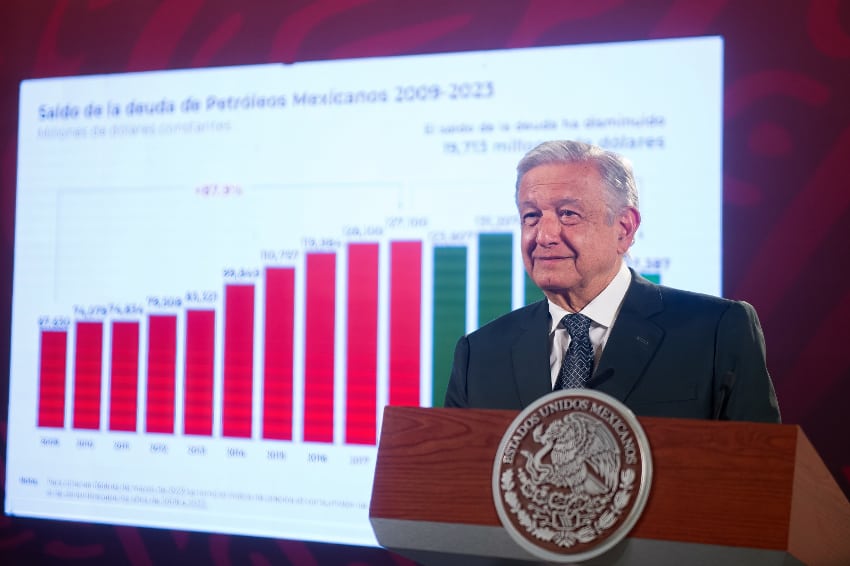
López Obrador went on to enumerate four economy-related positives during his administration.
“Number one – the best thing – [has been] the increase to worker’s incomes,” he said, asserting that that the growth in wages during his government is the strongest in 30 years.
Spending on social programs has increased by an amount “not seen in half a century,” AMLO added.
“Thirdly, when [before] had more than US $60 billion in annual remittances been received? Fourthly, when was the last time our peso maintained such strength without devaluation?”
López Obrador later rejected a Reforma newspaper report, which – citing experts from the National Autonomous University – said that that an oil spill in the Bay of Campeche extended over an area of 467 square kilometers.
AMLO said that the spill was in fact “very, very small” and that the reporting by Reforma – his least favorite Mexican newspaper – was an “exaggeration” and an “invention.”
“Maybe they’ll be able to prove that in the ‘Who’s Who in the Lies [of the Week segment],” he said, referring to the fake news exposé session presented every week at his Wednesday morning press conference.
One reporter noted that the head of the consumer protection agency Profeco, Ricardo Sheffield, said last week that the water system in Veracruz city – which has been run by a private company since 2016 – is the worst in the entire country.
“As we all know, the neoliberal policy … consisted in giving concessions and contracts to private companies,” López Obrador said, adding that ports, highways, mines, banks, garbage collection services, jails and water were all privatized by past governments.
“We’re going to look at this [issue] in Veracruz, see what we can do, what the situation is,” he said.
“… This is what has been inherited [by my government],” AMLO added.
Toward the end of his first presser of the week, the president said that the modernized train line across the Isthmus of Tehuantepec between Salina Cruz, Oaxaca, and Coatzacoalcos, Veraacruz, would be completed this September. He said he expected that a passenger train and freight trains would begin operating on the railroad the same month.
Before concluding his mañanera, López Obrador noted that he would meet later in the day with Homeland Security Advisor Elizabeth Sherwood-Randall to discuss “migration, drug trafficking, weapons and development cooperation.”
“The relationship with the government of President Biden is very good,” he added.
“… We’re working very well with the United States government, there aren’t major differences [between us].”
Tuesday
During the government’s regular security update, Security Minister Rosa Icela Rodríguez noted that preliminary statistics published by national statistics agency INEGI on Tuesday morning showed that homicides decreased by almost 10% in annual terms last year.
“From January to December of 2022, 32,223 homicides were recorded in Mexico, which means deaths decreased 9.7% with respect to 2021,” she said.
López Obrador declared that the data was “very encouraging” and said that the government estimated that homicides have declined 17% since he took office in December 2018.
“This is a great achievement, it’s the fruit of the work that the security cabinet carries out every day. The strategy of attending to the causes of violence is starting to yield results, because from the first day of government we started improving the living and working conditions of the people of Mexico,” he said.
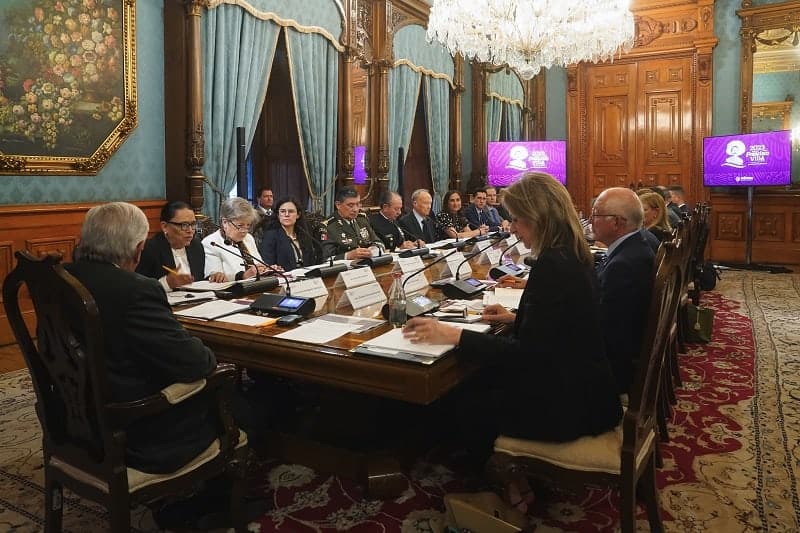
Asked about his meeting on Monday with Sherwood-Randall, AMLO – who wrote on social media that the talks were “very productive” – said that a report would be provided on Wednesday “because today we have a trilateral meeting” with both U.S. and Canadian officials.
“What was agreed on matters of migration, fentanyl and weapons will be announced tomorrow,” he said.
López Obrador subsequently thanked United States President Joe Biden for filing a complaint against Texas Governor Greg Abbott for installing in the Rio Grande a floating barrier aimed at stopping migrants crossing into the U.S. from Mexico.
“They’re violating our sovereignty and violating international treaties and agreements as well as bilateral agreements … with respect to our territories,” he said.
“… So, we very much appreciate that President Biden has filed this complaint,” AMLO said.
“… In one word, it’s politicking what … [Abbott] is doing and I believe that it will be counterproductive for him because the Texans, our neighbors, our brothers, aren’t going to approve of these illegal, authoritarian, arrogant and inhumane insults,” he said.
“He won’t have the support of the citizens of Texas, much less Mexican Americans, and he won’t have the support of any humanitarian person who understands the causes of migration,” AMLO said.
López Obrador later thanked the members of the Interdisciplinary Group of Independent Experts (GIEI), who for the past eight years has been investigating the 2014 disappearance and presumed murder of 43 students in Iguala, Guerrero.
“I met with the group. There are two [members] who stayed on [in Mexico] but they’re now finishing their work. We thank them for what they have done – a good investigation – and today they will present a report,” he said of a document that concluded that municipal, state and federal security forces were complicit in the abduction of the Ayotzinapa Rural Teachers’ College students.
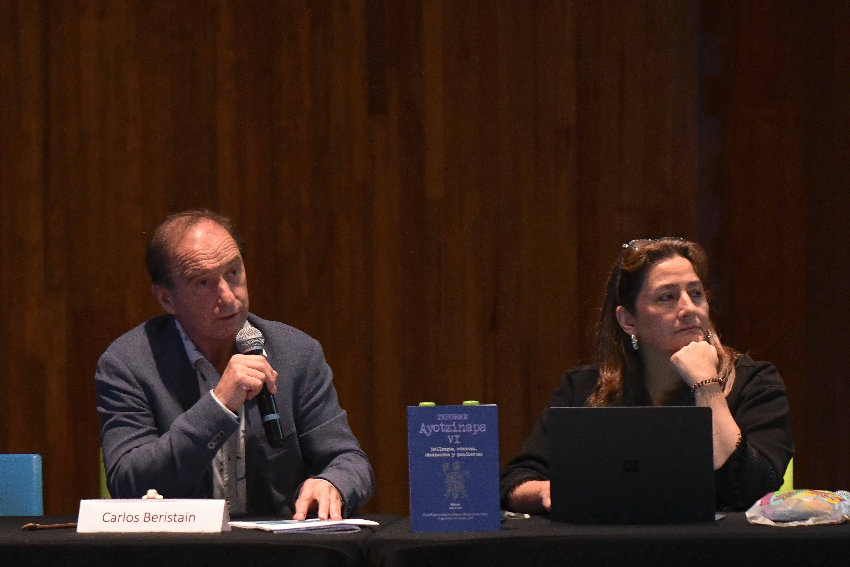
“We’re going to continue with the investigation. A lot of progress has been made. … High-ranking public officials, … both civilian and military, have been arrested and the investigation continues,” AMLO said.
Wednesday
At a trilateral meeting on Tuesday, Mexico, the United States and Canada agreed to “increase and strengthen actions to cut [fentanyl] supply chains,” said Security Minister Rodríguez.
The three countries will ramp up supervision and inspections at “ports and borders,” she said.
Rodríguez also said that Mexico, the U.S. and Canada agreed on “the creation of a working group to stop traffickers of synthetic drugs using legitimately established commercial companies for their [illicit] purposes.”
“… The members of the three delegations agreed to continue the preventive policy to avoid the trafficking and consumption of drugs as part of the task of attending to the causes of violence,” she said.
With regard to the illegal trafficking of weapons, Mexico and the United States agreed to “the electronic … [tracking] of all firearms seized from criminal organizations in our country,” the security minister said.
“It’s clear that 70% of weapons confiscated in Mexico come from the United States,” she added.
Making her maiden mañanera appearance, new Foreign Affairs Minister Alicia Bárcena spoke about migration.
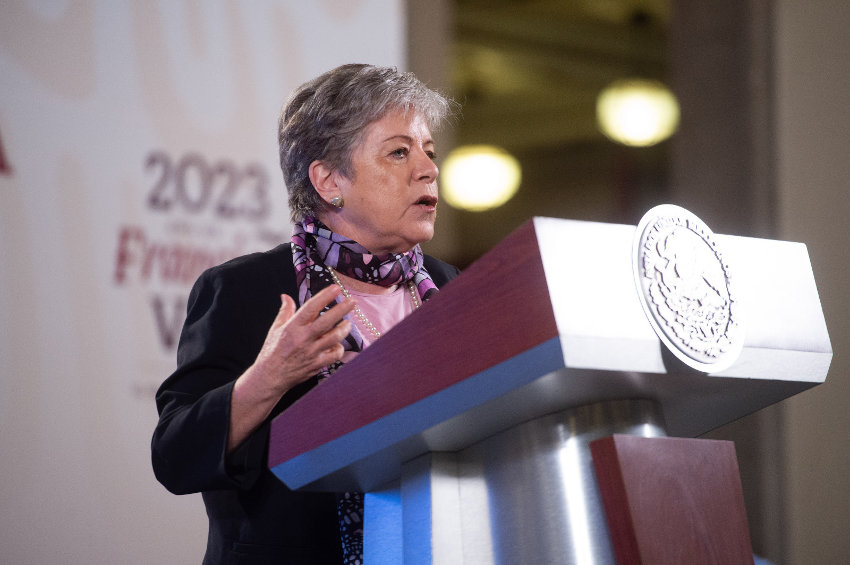
“Why is the issue so important? Because Mexico – and of course we presented this in the bilateral meeting [with the United States] – is very committed to a migration strategy that is comprehensive, orderly, … safe, regular and humane,” she said.
Bárcena, a former United Nations official who succeeded Marcelo Ebrard as foreign minister last month, said that Mexico and the United States are working on a plan to set up an “international space” in the south of the country where “multiple services” will be offered to Cubans, Nicaraguans, Haitians and Venezuelans who came to Mexico with the intention of migrating to the U.S.
The “space” – described as an “international crossing point” in a Foreign Affairs Ministry statement – would stop migrants from taking the “painful” journey through Mexico to the northern border, during which they “suffer so much because they endure violence and are attacked and kidnapped,” she said.
Barcena offered few details about the bilateral plan, but said that “shelter services” and “employment options” on government infrastructure projects in southern and southeastern Mexico would be offered to migrants.
Back behind the mañanera lectern, López Obrador highlighted a key finding of a recent poll conducted by the company Covarrubias.
“If the elections for president of the republic were held today, could you please tell me which option you would vote for?” said AMLO, reading aloud from the survey.
He noted that the ruling Morena party and its allies, the Labor Party and the Green Party, had the support of 49% of respondents, while the PAN-PRI-PRD alliance was chosen by 19% of those polled and the Citizens Movement party had the backing of 7%. (One quarter of respondents didn’t nominate a preferred party).
“What’s the difference [between Morena and the opposition bloc]? Thirty [points],” López Obrador said.
He also highlighted the results of a poll published in the El País newspaper, noting that Morena attracted effective support of 60% while the PAN and the PRI received the backing of just 14% and 12% of respondents, respectively.
“We’re doing very well as a country,” AMLO added. “…Mexico is a global example for its management of the economy, its social policy, the way in which we’re confronting the scourge of violence and our foreign relations.”
Thursday
“I’m very happy, like a peacock, very, very, very happy,” AMLO said after noting that the results of a survey by national statistics agency INEGI showed that the incomes of Mexico’s poorest citizens has increased during his term in government.
The president presented data that showed that the quarterly incomes of the poorest decile of the population increased 19.9% between 2018 and 2022, rising to 13,411 pesos (about US $800 at the current exchange rate) from 11,183 pesos.
López Obrador also noted that the income gap between Mexico’s richest and poorest citizens had narrowed. In 2016, the wealthiest decile earned 21 times more than the poorest 10% of the population, while in 2022 the former only made 15 times more than the latter, he said.
AMLO said that the results of the biennial survey, published on Wednesday, showed that the government’s strategy of “attending to all” but “giving preference to the poor” is working.
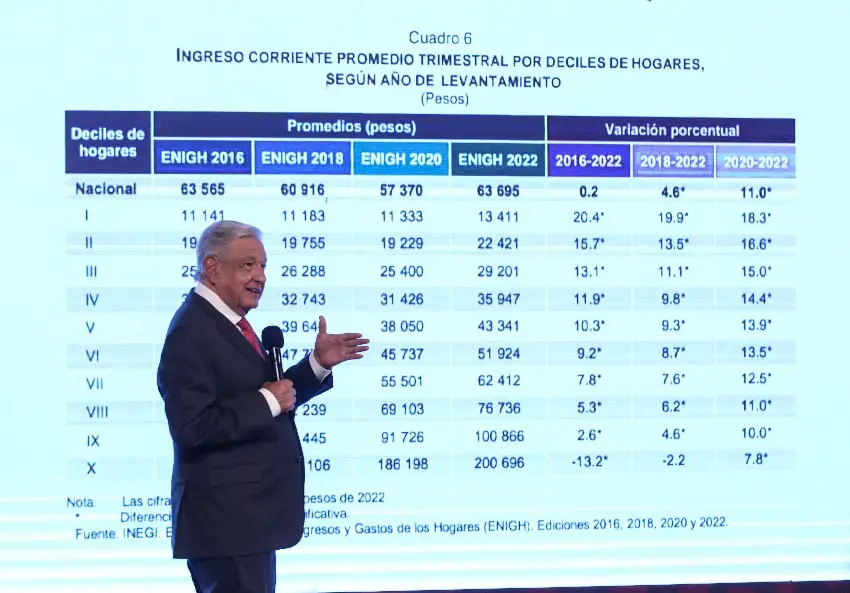
“We’ve managed … to reduce poverty in the time we’ve been in government, and that is no small feat,” he said.
“Being able to say that the poorest people are receiving more fills me with pride and satisfaction,” López Obrador said.
Later in the press conference, a reporter from Morelos claimed that the people of the small central Mexican state feel “practically abandoned” by “absent” Governor Cuauhtémoc Blanco, a former star of Mexico’s national soccer team who was elected on a Social Encounter Party ticket but is now representing Morena.
“There is data from a civil association … that shows the governor has only attended 35 of 365 [state government] meetings that are held to improve security,” the reporter said.
“I respect your point of view, your opinion, but I don’t share it,” AMLO responded.
“I believe that progress is being made in Morelos [thanks to] joint action of the state government led by Cuauhtémoc Blanco and the federal government,” he said.
López Obrador also asserted that the people of Morelos are much better off with Blanco in the state’s top job than they were with former governor Graco Ramírez, whose six-year term ended in 2018.
Once again addressing the 2014 mass kidnapping in Iguala, the president told the press corps that the government has made progress in “clarifying what happened to the young men from Ayotzinapa.”
“There are about 115 people detained and not just low-ranking officials or people with little influence. No, the former [federal] attorney general is detained, two generals are detained … and other important public officials are detained. There is no impunity,” he said.
“… We’re working on the search [for the students]. The most important thing now is the search because we now have information, the so-called pact of silence was broken and we now have an approximation of what happened and who was responsible,” López Obrador said.
“… What matters most to us, what interests us, is to find out where the young men are. We can fill the jails with culprits but what if we don’t find the young men? So, we’re working on that every day – searching to find the young men,” he said.
Among other remarks, AMLO noted that the International Monetary Fund has increased its 2023 growth forecast for Mexico to 2.6% and announced that the government intended to make an offer of 6.5 billion pesos for the Quintana Roo property of United States construction aggregates company Vulcan Materials, which in March denounced the “illegal” takeover and occupation of its Riviera Maya marine terminal by federal and state security forces.
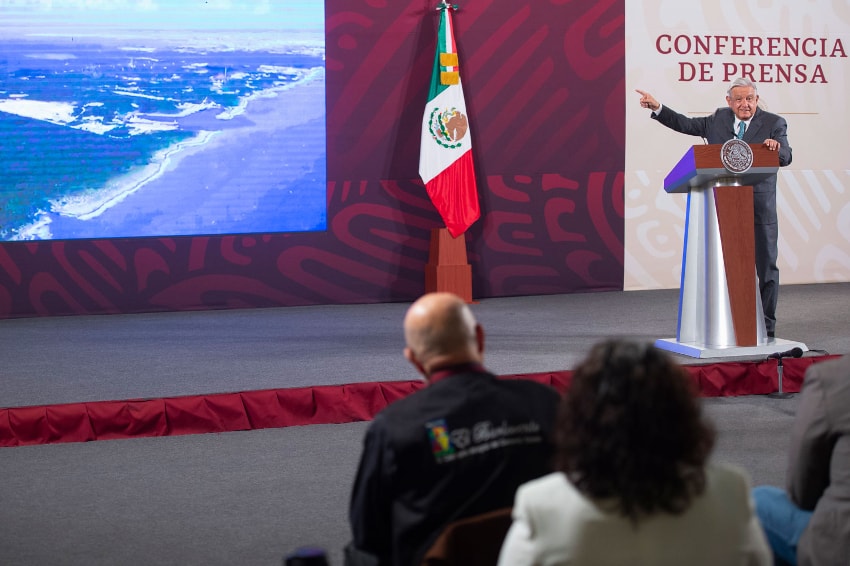
He also reminded reporters that his Friday press conference would be held in Tepic, Nayarit.
“I’m going to begin a tour in Nayarit to look at water projects,” López Obrador said, adding that he will also travel to Sinaloa, Durango, Coahuila and Nuevo León in the coming days to inspect progress on the construction of new water infrastructure in those states.
Friday
Governor Miguel Ángel Navarro Quintero welcomed the president to Nayarit, and said he could confirm that the Pacific coast state has benefited greatly from federal investment.
“At the end of this year we’ll finish [work on] the [Tepic] airport, which as of this week is an international airport thanks to your support. It will also be a freight airport,” Navarro said.
The Nayarit governor highlighted other infrastructure undertakings in the state, including highway improvements and water and health care projects.
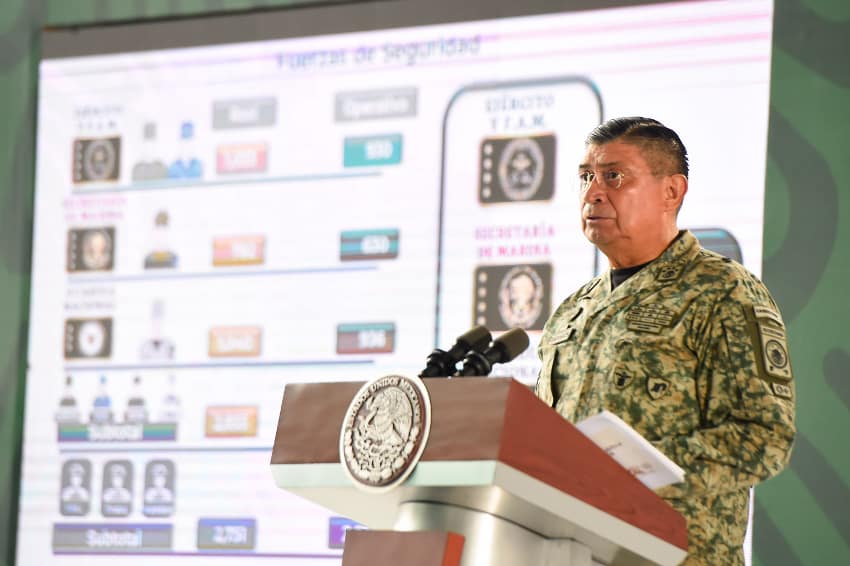
National Defense Minister Luis Cresencio Sandoval reported that Nayarit ranks as the 26th most violent state during the term of the current federal government in terms of total homicides with 748 between December 2018 and June 2023. He noted that on a per capita basis, Nayarit ranks as the 21st most violent state out of the 32 federal entities with 61 homicides per 100,000 people during the past 4 1/2 years.
Early in his engagement with reporters, AMLO was asked about Drug Enforcement Administration Administrator Anne Milgram’s statement on Thursday that the Sinaloa Cartel and the Jalisco New Generation Cartel have more than 44,000 “members, associates, facilitators and brokers” around the world.
“We don’t have that information. I don’t know where the DEA lady got it from,” López Obrador said.
“Hopefully they give us more details. … They should tell us the proof they have,” he said.
AMLO said that U.S. authorities hadn’t disclosed the information shared by Milgram at security meetings in Mexico City earlier this week.
“That’s a problem they have in the United States government. I say it with complete respect, there’s no coordination between [the different departments],” he said.
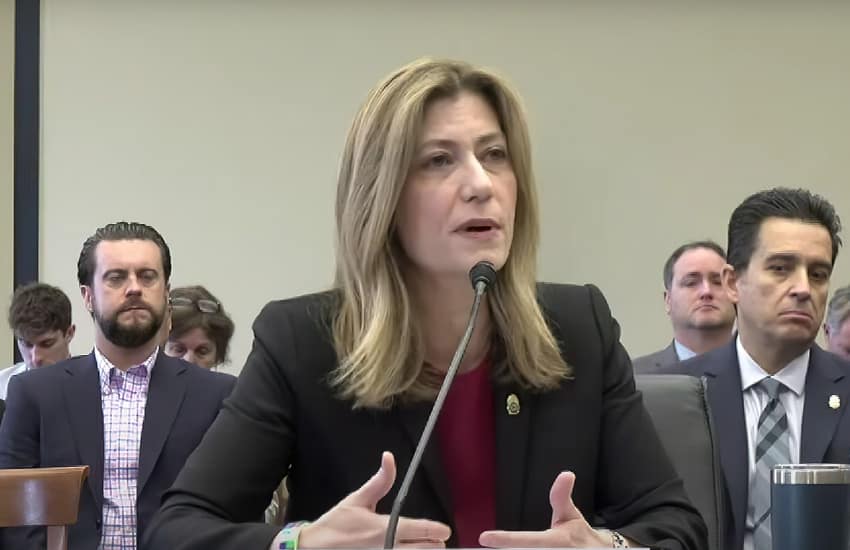
“… That’s the way it was before in Mexico, but order was established. Before the Ministry of Defense worked on its own, the navy did its own thing, the Security Ministry did as well and the state governments did what corresponded to them. Now we all work together … and we take joint decisions,” López Obrador said.
The president recalled that he rejected a 2021 claim by a United States military general that about one-third of Mexico’s territory is controlled by criminal organizations, and asserted that U.S. authorities “don’t have good information.”
Later in his presser, López Obrador said that he had received a response to a letter he sent to Israeli Prime Minister Benjamin Netanyahu to seek the extradition of former law enforcement official Tomás Zerón, who is wanted in connection with the case involving the disappearance of the 43 students.
He said there is “willingness” on the part of the Israeli government “to help us,” but didn’t confirm that it would actually agree to the extradition of Zerón, who is accused of abduction, torture and tampering with evidence in the investigation into the student’s abduction and presumed murder.
Although he has been prohibited by the National Electoral Institute from speaking about electoral issues, AMLO couldn’t resist making remarks about leading opposition bloc presidential hopeful Senator Xochitl Gálvez toward the end of his mañanera. He questioned the relationship companies owned by Gálvez had with firms based in the Mexico City borough of Miguel Hidalgo, of which the senator was mayor between 2015 and 2018.
López Obrador said that most of the “clients” of Gálvez’s companies – which he has previously said received government contracts worth some 1.5 billion pesos over a period of nine years – are in Miguel Hidalgo, “where coincidentally she was borough chief.”
“The authorities are the ones that have to investigate if there is something improper, if there is influence peddling, if there is corruption,” he said.
The president ruled out any chance that he would seek to have the senator’s immunity from prosecution removed, a process known as desafuero.
“I’m not going to do that, I would never do that. … I suffered a desafuero [when I was Mexico City mayor]. How could I do the same thing that was done to me!” he said shortly before bringing his final press conference of the week to a close.
By Mexico News Daily chief staff writer Peter Davies ([email protected])
Source: Mexico News Daily

